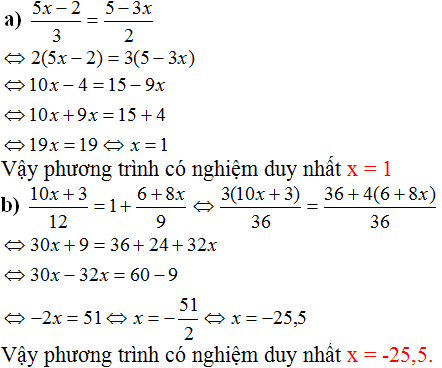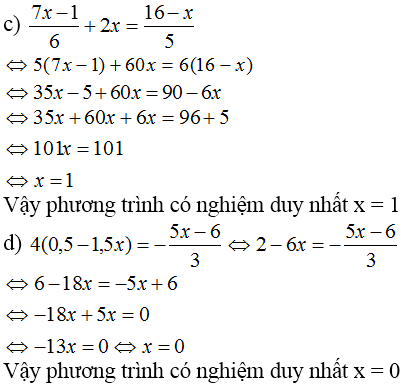Hãy nhập câu hỏi của bạn vào đây, nếu là tài khoản VIP, bạn sẽ được ưu tiên trả lời.

a: \(\Leftrightarrow20x^2-12x+15x+5< 10x\left(2x+1\right)-30\)
\(\Leftrightarrow20x^2+3x+5< 20x^2+10x-30\)
=>3x+5<10x-30
=>-7x<-35
hay x>5
b: \(\Leftrightarrow4\left(5x-20\right)-6\left(2x^2+x\right)>4x\left(1-3x\right)-15x\)
\(\Leftrightarrow20x-80-12x^2-6x>4x-12x^2-15x\)
=>14x-80>-11x
=>25x>80
hay x>16/5

a)Thay m=-1 vào phương trình ta đc:
\(4.\left(-1\right)^2.x-4x-3.\left(-1\right)=3\)
\(\Leftrightarrow4x-4x+3=3\)
\(\Leftrightarrow0x=0\)(Luôn đúng)
\(\Leftrightarrow\)Pt có vô số nghiệm
Vậy pt có vô số nghiệm.
b)Thay x=2 vào phương trình ta có:
\(4m^2.2-4.2-3m=3\)
\(\Leftrightarrow8m^2-8-3m=3\)
\(\Leftrightarrow8m^2-3m-11=0\)
\(\Leftrightarrow8m^2+8m-11m-11=0\)
\(\Leftrightarrow8m\left(m+1\right)-11\left(m+1\right)=0\)
\(\Leftrightarrow\left(m+1\right)\left(8m-11\right)=0\)
\(\Leftrightarrow\orbr{\begin{cases}m+1=0\\8m-11=0\end{cases}}\)
\(\Leftrightarrow\orbr{\begin{cases}m=-1\\m=\frac{11}{8}\end{cases}}\)
Vậy tập nghiệm của pt là S={-1;\(\frac{11}{8}\)}
c)Ta có:
\(5x-\left(3x-2\right)=6\)
\(\Leftrightarrow5x-3x+2=6\)
\(\Leftrightarrow2x=4\)
\(\Leftrightarrow x=2\)
Có x=2 là nghiệm của pt \(5x-\left(3x-2\right)=6\)
Để \(4m^2x-4x-3m=3\Leftrightarrow5x-\left(3x-2\right)=6\)
\(\Leftrightarrow\)x=2 là nghiệm của \(4m^2x-4x-3m=3\)
Thay x=2 vào pt trên ta đc:
\(4m^2.2-4.2-3m=3\)(Giống câu b)
Vậy m=-1,m=11/8...
d)Có:\(4m^2x-4x-3m=3\)
\(\Leftrightarrow4x\left(m^2-1\right)=3+3m\)
Để pt vô nghiệm
\(\Leftrightarrow\hept{\begin{cases}m^2-1=0\\3+3m\ne0\end{cases}}\)
\(\Leftrightarrow\hept{\begin{cases}m=\pm1\\m\ne-1\end{cases}}\)
\(\Leftrightarrow m=1\)
Vậy m=1 thì pt vô nghiệm.

Bài làm
a) 3x - 1 = 2x + 4
<=> x = 5
Vậy x = 5 là nghiệm phương trình.
b) x( x + 3 ) = ( 2x + 1 )( x + 3 )
<=> x( x + 3 ) - ( 2x + 1 )( x + 3 ) = 0
<=> ( x + 3 )( x - 2x - 1 ) = 0
<=> ( x + 3 )( -x - 1 ) = 0
<=> x + 3 = 0 hoặc -x - 1 = 0
<=> x = -3 hoặc x = -1
Vậy x = -3 hoặc x = -1 là tập nghiệm phương trình
c) quy đồng mẫu ra r lm, bh ngủ.

c: \(\Leftrightarrow2x-8>=2x+1\)
=>-8>=1(vô lý)
d: \(\Leftrightarrow20x^2-12x+15x+5< 10x\left(2x+1\right)-30\)
\(\Leftrightarrow20x^2+3x+5< 20x^2+10x-30\)
=>10x-30>3x+5
=>7x>35
hay x>5

thực hiện các phép biến đổi để đưa các phương trình đã cho về các phương trình tương đương có dạng ax+b=0 hoặc ax=-b,ta được:
a)5x-2/3=5-3x/2⇔2(5x-2)=3(5-3x)⇔10x-4=15-9x⇔10x+9x=15+4⇔19x=19⇔x=1
phương trình có 1 nghiệm x=1

a: \(\Leftrightarrow1-x+3x+3=2x+3\)
=>2x+4=2x+3(vô lý)
b: \(\Leftrightarrow\left(x+2\right)^2-2x+3=x^2+10\)
\(\Leftrightarrow x^2+4x+4-2x+3=x^2+10\)
=>4x+7=10
hay x=3/4
d: \(\Leftrightarrow\left(-2x+5\right)\left(3x-1\right)+3\left(x-1\right)\left(x+1\right)=\left(x+2\right)\left(1-3x\right)\)
\(\Leftrightarrow-6x^2+2x+15x-5+3\left(x^2-1\right)=\left(x+2\right)\left(1-3x\right)\)
\(\Leftrightarrow-6x^2+17x-5+3x^2-3=x-3x^2+2-6x\)
\(\Leftrightarrow-3x^2+17x-8=-3x^2-5x+2\)
=>22x=10
hay x=5/11


a: =>2,5x-0,5-4,5+2m(x-2)
=>2,5x+2mx-4m-5=0
=>x(2m+2,5)=4m+5
=>x(4m+5)=8m+10
TH1: m=-5/4
=>Phương trình có vô số nghiệm
=>Nhận
TH2: m<>-5/4
Phương trình có nghiệm duy nhất là x=(8m+10)/(4m+5)=2(loại)
b: =>\(\dfrac{3mx+12m+5}{9m^2-1}=\dfrac{\left(2x-3\right)\left(3m-1\right)+\left(3x-4m\right)\left(3m+1\right)}{\left(3m-1\right)\left(3m+1\right)}\)
=>6xm-2x-9m+3+9xm+3x-12m^2-4m=3mx+12m+5
=>-12m^2+15xm+x-13m+3-3mx-12m-5=0
=>-12m^2+x(15m+1-3m)-25m-2=0
=>x(12m+1)=12m^2+25m+2
=>x(12m+1)=(m+2)(12m+1)
Th1: m=-1/12
=>PT luôn có nghiệm
=>Nhận
TH2: m<>-1/12
Để phương trình có nghiệm âm thì m+2<0
=>m<-2